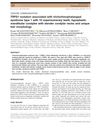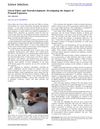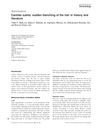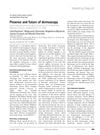 July 2023 in “Dermatology practical & conceptual”
July 2023 in “Dermatology practical & conceptual” The machine learning model effectively assesses the severity of hair loss and could help dermatologists with treatment decisions.
19 citations,
August 2022 in “Forensic Science International Genetics” The model accurately predicts age from saliva and buccal cells for forensic use.
 April 2021 in “Journal of Investigative Dermatology”
April 2021 in “Journal of Investigative Dermatology” Spironolactone safely and effectively treats hair loss in female scarring alopecia patients.
12 citations,
January 2013 in “Indian dermatology online journal” Dermatopathia pigmentosa reticularis causes skin discoloration, hair loss, and nail problems.
 1 citations,
July 2023 in “International Journal of Molecular Sciences”
1 citations,
July 2023 in “International Journal of Molecular Sciences” Old psychiatric drugs are increasingly being used for new purposes, and technologies like SmartCube® help create new drugs.
July 2020 in “International journal of clinical & experimental dermatology” Hair loss in women aged 20-30 is often linked to deficiencies in Vitamin D, zinc, ferritin, and haemoglobin, as well as low SHBG levels in those with irregular periods.
 9 citations,
April 2020 in “Journal of dermatology”
9 citations,
April 2020 in “Journal of dermatology” A person with a specific gene mutation had extra teeth, unique jaw and hair features not seen before in this condition.
 February 2025 in “BMC Public Health”
February 2025 in “BMC Public Health” Unhealthy diet and lifestyle choices may increase the risk of hair loss in women.
15 citations,
August 2017 in “Pediatrics in review” Regular blood pressure checks and lifestyle changes are crucial for managing hypertension in children and teens.
 3 citations,
June 2017 in “Environmental health perspectives”
3 citations,
June 2017 in “Environmental health perspectives” Exposure to certain glycol ethers during pregnancy may be linked to lower verbal comprehension in children.
 12 citations,
November 1987 in “Pediatric dermatology”
12 citations,
November 1987 in “Pediatric dermatology” Four children had unmanageable pale blond hair due to uncombable-hair syndrome.
 3 citations,
March 2019 in “Tekstil Ve Konfeksiyon”
3 citations,
March 2019 in “Tekstil Ve Konfeksiyon” Anatolian native goat down-hair is similar to cashmere and can be used for high-quality textiles.
 August 1978 in “Dicp-The annals of pharmacotherapy”
August 1978 in “Dicp-The annals of pharmacotherapy” Crash diets can cause temporary hair loss, and professional medical advice can prevent serious health issues.
 August 1978 in “Dicp-The annals of pharmacotherapy”
August 1978 in “Dicp-The annals of pharmacotherapy” Mannitol diuresis allows higher doses of cis-platinum for testicular cancer treatment without increasing kidney damage.
2 citations,
January 2022 in “The Application of Clinical Genetics” A young Russian girl with Meier-Gorlin syndrome has two new mutations in the CDC6 gene.
110 citations,
January 1984 in “Progress in brain research” Gonadal hormones may influence sex differences in play fighting in animals, but their effect on human spatial behavior is unclear and needs more research.
January 2023 in “Springer eBooks”  10 citations,
April 2020 in “Clinics in Dermatology”
10 citations,
April 2020 in “Clinics in Dermatology” Biotin supplements improved skin and hair problems in a girl with biotinidase deficiency.
 8 citations,
October 2023 in “JMIR dermatology”
8 citations,
October 2023 in “JMIR dermatology” ChatGPT can be a helpful dermatology resource but should not replace professional consultations.
 November 2023 in “Indian Journal of Dermatology, Venereology and Leprology”
November 2023 in “Indian Journal of Dermatology, Venereology and Leprology” Using a mechanical pencil to hold a needle makes hair transplant surgery easier and faster.
 April 2024 in “Food science & nutrition”
April 2024 in “Food science & nutrition” Many displaced schoolchildren in Cameroon are malnourished, with high rates of thinness, stunting, underweight, and deficiencies in iron and protein.
 1 citations,
November 2023 in “American journal of clinical pathology”
1 citations,
November 2023 in “American journal of clinical pathology” Transgender men on testosterone therapy need ongoing gynecologic care due to potential cancer risks.
 6 citations,
February 2016 in “International Journal of Dermatology”
6 citations,
February 2016 in “International Journal of Dermatology” The true cause of hair suddenly turning white is still unknown.
 4 citations,
March 2022 in “Journal of The American Academy of Dermatology”
4 citations,
March 2022 in “Journal of The American Academy of Dermatology” Direct-to-consumer teledermatology is not effectively reaching underserved populations due to language, technology, and insurance barriers.
 July 2008 in “Journal of Intellectual Property Law & Practice”
July 2008 in “Journal of Intellectual Property Law & Practice” Australian court ruled that Bickfords did not infringe on Monster Energy's trade mark because Monster was not sold or known in Australia at the time.
 2 citations,
December 2019 in “Archives of Craniofacial Surgery”
2 citations,
December 2019 in “Archives of Craniofacial Surgery” Using a method of stretching skin multiple times can help cover large bald spots on the scalp, but it takes a long time and isn't good for kids.
 June 2021 in “International journal of research in dermatology”
June 2021 in “International journal of research in dermatology” A boy and his father with hereditary hypotrichosis simplex were treated for hair loss, but the treatment result is unknown.
September 2022 in “Indian Journal of Paediatric Dermatology” Clouston syndrome is inherited in an autosomal dominant pattern and caused by a specific gene mutation, with no current treatment available.
 11 citations,
December 2006 in “Expert Review of Dermatology”
11 citations,
December 2006 in “Expert Review of Dermatology” Dermoscopy is becoming essential for diagnosing skin conditions and is expected to be a standard tool for dermatologists.
 September 2024 in “Journal of Investigative Dermatology”
September 2024 in “Journal of Investigative Dermatology” A new tool can analyze hair to detect changes due to hormones, genetics, and aging.






















